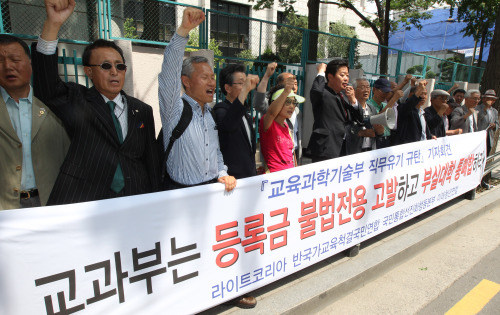Demographic shift adds urgency to the need for reformThis is the third and last installment of a three-part series looking into problems in Korea’s tertiary education ― Ed.
Earlier this month, professors at Sunghwa College received 136,000 won as their salary and a text message that the rest would be wired once the institution collected tuition fees from students.
The college, where about 1,200 students are enrolled, has been criticized for corruption and mismanagement for years. The Education Ministry, in its 2006 examination of the institution, detected 19 cases of irregularities, including misuse of school funds, and penalized 105 out of its 117 administrative staff.
This time, Sunghwa may face the axe, as the government finally rolls up its sleeves to restructure the country’s bloated higher education sector.

Civic groups hold a rally in front of the Education Ministry building in Seoul, demanding the government act on corruption at private universities, on June 17. (Yonhap News)
“In pushing for the reform of universities, the government must be prudent so that students enrolled in them do not suffer disadvantages,” President Lee Myung-bak told a Cabinet meeting Tuesday.
“Some schools may have to close,” the president’s spokesperson said later, explaining the meaning of Lee’s remarks. “The president asked his staff to do their best to look after them, in such a case.”
In education-obsessed Korea, almost 80 percent of high school graduates proceed to higher education. This fervor has led to an abundance of colleges and universities.
The country of 48 million now has 347 colleges and universities with 3.3 million enrolled.
The schools, however, will find it increasingly hard to fill their seats.
According to the Statistics Korea, the nation’s college-age population is projected to peak at 690,000 next year, plunging to 420,000 by 2025. The total headcount enrollment in higher education in Korea approaches 600,000.
By 2018, the number of high school graduates will fall below the university enrollment figure.
According to the Education Ministry, eight of the nation’s 200 four-year universities failed to fill over 80 percent of seats this year. Most of them are religiously affiliated. Youngsan University of Son Studies in South Jeolla Province filled just 24 percent of seats, the lowest among the eight, followed by Tamna University in Jeju at 31.2 percent.
The ministry announced earlier this month that it will cut financial support for less competitive private schools which have been designated as “underperforming,” based on their credit ratings and their graduates’ rate of employment. Private institutions account for 90 percent of all colleges and universities in Korea.
The number of schools on the blacklist will rise from 23 to 50 next year, said Education Minister Lee Ju-ho in a meeting with the presidents of 31 public universities.
Even public schools have not been spared. “Of the total 31 public universities, those ranking in the bottom 15 percent in an evaluation will face a major restructuring, including a reduction in student enrollment,” Lee said.
All “underperforming” public and private schools will be excluded from their 1.6 trillion won financing project for universities, said both the Education Ministry and the Ministry of Knowledge Economy.
Students in these “underperforming” schools will also face restrictions in taking out student loans through the income-contingent loan program, which the government introduced last year.
Universities are set to face another wave of scrutiny as the Board of Audit and Inspection is preparing to launch its largest-ever audit of private and public universities in August.
About 200, or one third of the entire BAI staff, will be mobilized for the inspection, which will look into overall finances of the universities, with a particular focus on the way they set tuition levels. A preliminary examination will begin next month upon some 20 schools, BAI officials said.
The moves come after a massive rally by students over skyrocketing tuition fees. In order to bolster the government’s support to universities, the government must weed out ill-managed and less competitive ones, officials say.
However, some express worry over the government reform.
Kim Young-gil, president of Handong Global University and the chair of the Korea Council for University Education, said the recent government moves risk damaging the autonomy of universities.
By Lee Sun-young (
milaya@heraldcorp.com)


![[AtoZ into Korean mind] Humor in Korea: Navigating the line between what's funny and not](http://res.heraldm.com/phpwas/restmb_idxmake.php?idx=645&simg=/content/image/2024/04/22/20240422050642_0.jpg&u=)


![[Exclusive] Korean military set to ban iPhones over 'security' concerns](http://res.heraldm.com/phpwas/restmb_idxmake.php?idx=645&simg=/content/image/2024/04/23/20240423050599_0.jpg&u=20240423183955)
![[Herald Interview] Why Toss invited hackers to penetrate its system](http://res.heraldm.com/phpwas/restmb_idxmake.php?idx=645&simg=/content/image/2024/04/22/20240422050569_0.jpg&u=20240422150649)
![[Graphic News] 77% of young Koreans still financially dependent](http://res.heraldm.com/phpwas/restmb_idxmake.php?idx=645&simg=/content/image/2024/04/22/20240422050762_0.gif&u=)